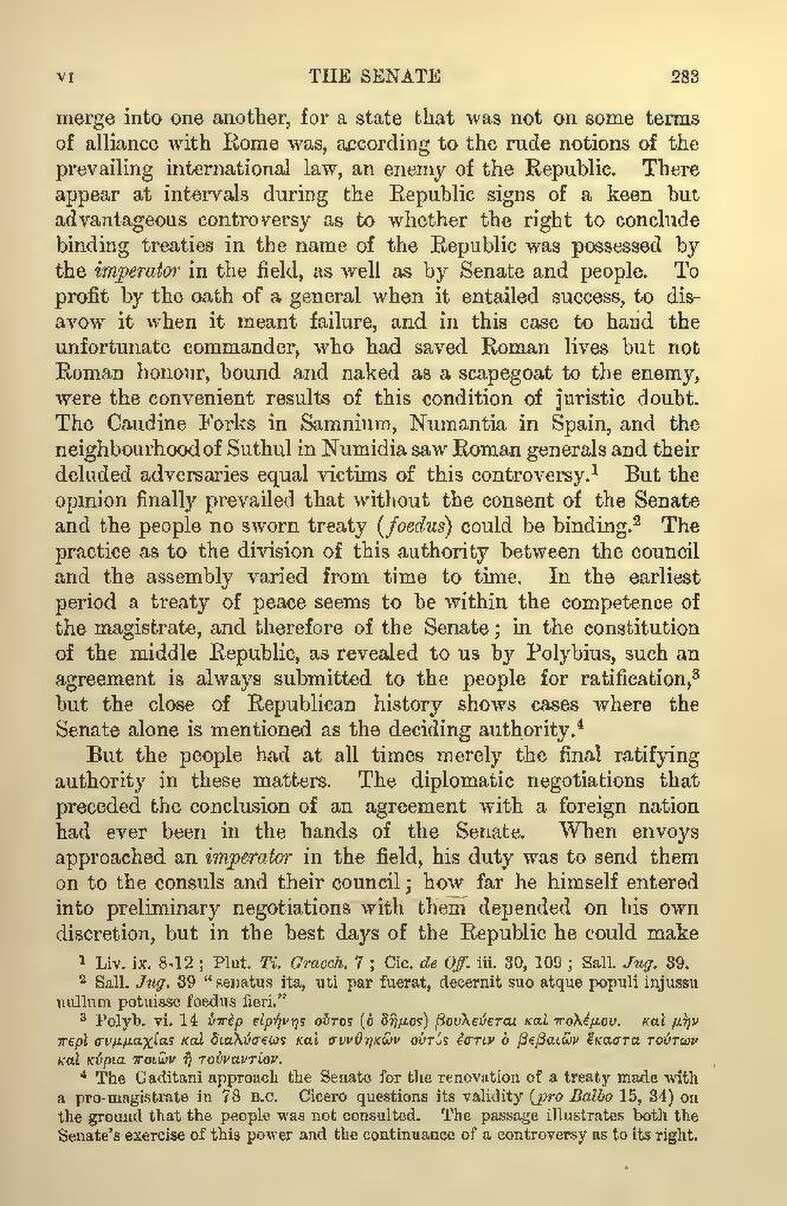merge into one another, for a state that was not on some terms of alliance with Rome was, according to the rude notions of the prevailing international law, an enemy of the Republic. There appear at intervals during the Republic signs of a keen but advantageous controversy as to whether the right to conclude binding treaties in the name of the Republic was possessed by the imperator in the field, as well as by Senate and people. To profit by the oath of a general when it entailed success, to disavow it when it meant failure, and in this case to hand the unfortunate commander, who had saved Roman lives but not Roman honour, bound and naked as a scapegoat to the enemy, were the convenient results of this condition of juristic doubt. The Caudine Forks in Samnium, Numantia in Spain, and the neighbourhood of Suthul in Numidia saw Roman generals and their deluded adversaries equal victims of this controversy.[1] But the opinion finally prevailed that without the consent of the Senate and the people no sworn treaty (foedus) could be binding.[2] The practice as to the division of this authority between the council and the assembly varied from time to time. In the earliest period a treaty of peace seems to be within the competence of the magistrate, and therefore of the Senate; in the constitution of the middle Republic, as revealed to us by Polybius, such an agreement is always submitted to the people for ratification,[3] but the close of Republican history shows cases where the Senate alone is mentioned as the deciding authority.[4]
But the people had at all times merely the final ratifying authority in these matters. The diplomatic negotiations that preceded the conclusion of an agreement with a foreign nation had ever been in the hands of the Senate. When envoys approached an imperator in the field, his duty was to send them on to the consuls and their council; how far he himself entered into preliminary negotiations with them depended on his own discretion, but in the best days of the Republic he could make.]
- ↑ Liv. ix. 8-12; Plut. Ti. Gracch. 7; Cic. de Off. iii. 30, 109; Sall. Jug. 39.
- ↑ Sall. Jug. 39 "senatus ita, uti par fuerat, decernit suo atque populi injussu nullum potuisse foedus fieri."
- ↑ Polyb. vi. 14 [Greek: hyper eirênês houtos (ho dêmos) bouleuetai kai polemou. kai mên peri symmachias kai dialyseôs kai synthêkôn houtos estin ho bebaiôn hekasta toutôn kai kyria poiôn ê tounantion
- ↑ The Gaditani approach the Senate for the renovation of a treaty made with a pro-magistrate in 78 B.C. Cicero questions its validity (pro Balbo 15, 34) on the ground that the people was not consulted. The passage illustrates both the Senate's exercise of this power and the continuance of a controversy as to its right.
